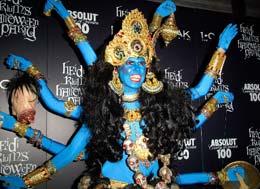The Wesern Condescension of Hinduism
As a child, I moved around frequently. My parents emigrated from India to the U.S. when I wasn’t even five years old, and we moved from place to place.
Unfortunately for me, the schools I attended weren’t ever very religiously diverse. Christian kids usually made up the vast majority of my peers.
In social studies class, however, we always covered India. As the second most populated country in the world – it was guaranteed to have a spot on the year’s lesson plan.
With the mention of India also came mention of Hinduism, the religion that millions of families like mine practiced.
“Wow, cool! All these weird-looking gods and goddesses with so many heads and arms! You really believe in all of them?” kids would ask me.
“Some of them look like monsters from scary movies!”
Hey, wait a second, there’s not really more than God; they’re just differences faces of one Supreme Being. And why are Shiva, Vishnu, Saraswati, and Lakshmi being referred to as ‘gods’ and ‘goddesses?’ The Bhagavad-Gita is mythology like Greek mythology? This is all wrong…
This was an experience I dealt with as a child and interestingly Hindus are still dealing with today: the misrepresentation and subsequent belittlement of Hinduism.
For a religion as established and tolerant as Hinduism, Western cultures have disrespected it through outlets of public education, media, and marketable fashions and trends.
The result: the face of Hinduism is represented in the West as a “mythological”, pagan religion.
That is what ensues when a child goes to school and reads, “Durga and Kali are terrible and extremely bloodthirsty forms of this goddess,” in a textbook like “The Ancient South Asian World,” printed by the Oxford University Press.
And Mahabharata is described as being, “…like adventure movies of today [that tells] thrilling stories about great heroes” as described in Glencoe-McGraw Hill’s “Discovering Our Past – Ancient Civilizations” textbook.
These certainly aren’t accurate statements about Hinduism. Jesus’s crucifixion is never referred to as a 'gripping, emotional roller coaster'.
Describing Durga and Kali as “terrible” and “bloodthirsty” paints vivid pictures in impressionable minds of demons and monsters like those out of fairytales.
Dictionary.com’s description of Krishna is as “one of the most popular gods… the divine cowherd whose erotic exploits, esp. with his favorite, Radha, have produced both romantic and religious literature.”
The relationship between Krishna and Radha is one of pure, eternal love as described by Hindu scriptures, and to reduce it to an “erotic exploit” conveys it solely as sexual relationship, in which Krishna gets all the girls.
In Spain during the summer of 2009, fast food giant Burger King revealed a new ad campaign depicting an image of Lakshmi sitting on a hamburger. The caption underneath translated to, “This snack is sacred.”
The image was used to increase Burger King’s profits and many Hindus saw it as sacrilege. It seemed sarcastic pun that Hindus don’t eat beef.
In 2008, supermodel Heidi Klum, known for her extravagant Halloween parties, dressed to impress – in a Goddess Kalicostume. While it was a very colorful and elaborate costume – complete with blue body paint, multiple prosthetic arms, and an unruly wig of black hair.
Cafepress.com is one of the many clothing sites, that has a variety of fashions available with Hindu imprints to them. A few include a couple with the images of Ganesh and Shiva reading “Ganesh/Shiva is my Om Boy” playing off the popular slang term “homeboy”.
Some might say these things aren’t a big deal because many don’t mean any blatant disrespect.
But what they don’t realize is the sheer disregard these actions shows for Hinduism.
Small actions have big impacts. Western cultures often heavily stress tolerance, but maybe empathy and education should be stressed more.
Knowledge opens doors and it could be the key for Hinduism finally to receive more respect as the ancient, established, and welcoming religion it really is.
Foram Mehta is an Indian American journalist living in New York City. To read more of her work go to www.metaphoricalmind.com.
Source: http://tinyurl.com/mooxkhp







